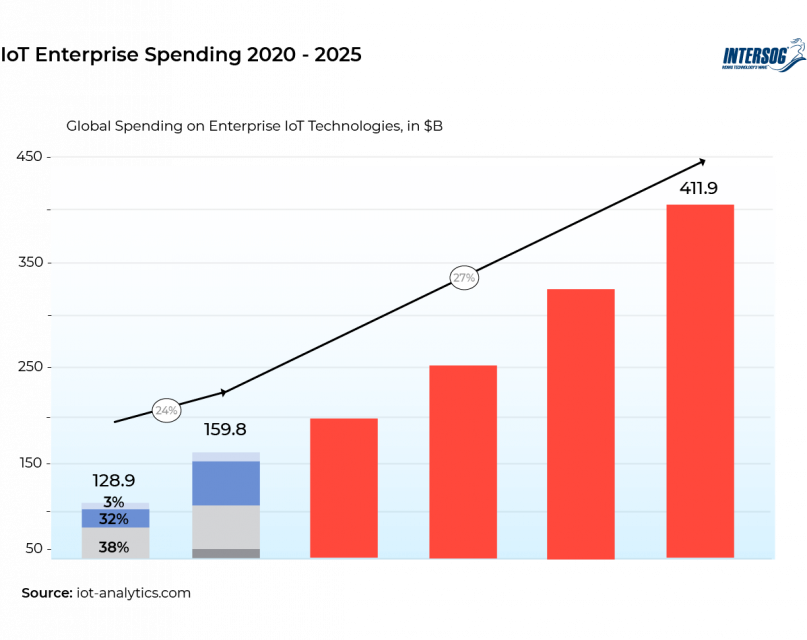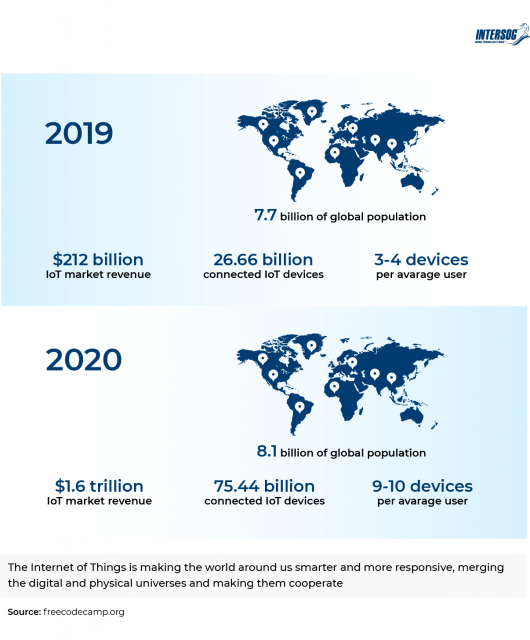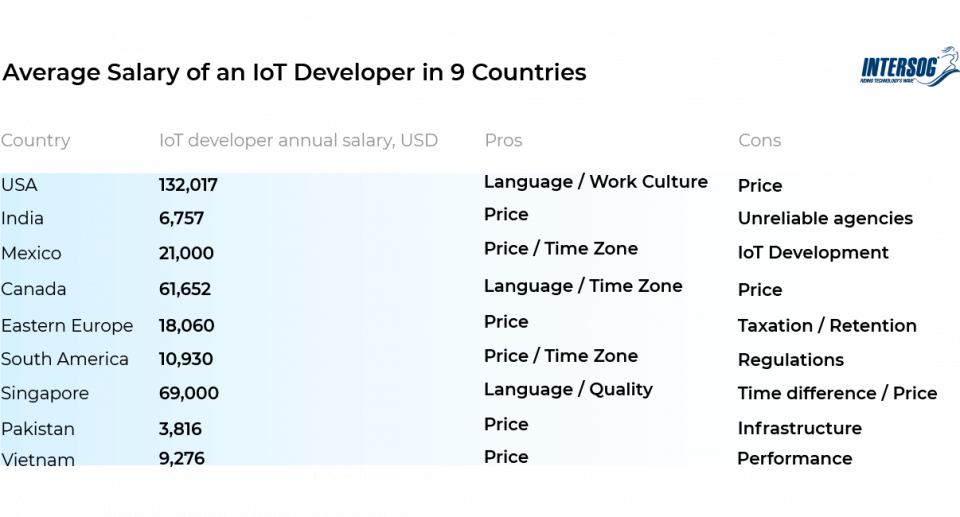You must have come across the term IoT hundreds of times by now; apparently, it is everyone nowadays, but what exactly is IoT, formally known as The Internet of Things?
The Internet of Things, or IoT, describes the network of billions of physical devices - “things” around the world that are connected to the internet and sharing data. Thanks to the rapid technological development, now it’s possible to connect almost anything to the internet, from a small lightbulb to an airplane, and turn it into a part of the IoT.
How big is the IoT?
Well, it’s big and getting bigger, as there are already more devices connected than people in the world. According to ZdNet, tech statistics predict that in total, there will be 41.6 billion connected IoT devices by 2025, or "things." Consumer IoT spending was expected to hit $108 billion, making it the second-largest industry segment: smart home, personal wellness, and connected vehicle infotainment will see much of the spending. Plus, the overall enterprise Internet of Things (IoT) spending grew 12.1% in 2020 to $128.9 billion, indicating that IoT remains a high-growth market with opportunities across the entire technology stack.

As technology keeps evolving, the digitization of society will continue, making the IoT an ever-increasing trend, creating more and more jobs. From robotic vacuums to self-driving cars and remote medical devices that let doctors diagnose patients, the Internet of Things will keep on growing. Ericsson predicts that by 2022, there will be around 29 billion of these devices connected to the internet globally.
Why is IoT so important?
Over the past few years, IoT has become one of the most critical technologies of the century. Connecting all these different objects to the web adds a level of digital intelligence to devices that would be otherwise “dumb,” enabling them to communicate real-time data without the need of human beings. In other words, in this hyperconnected world where we can connect everyday objects to the internet, we can achieve seamless communication between people, processes, and things.

The Internet of Things is making the world around us smarter and more responsive, merging the digital and physical universes and making them cooperate. Now, who makes the Internet of Things happen?
If we were in an exciting game of jeopardy, the correct answer would be “what is an IoT developer?” But what does an Internet of Things developer do exactly?
IoT work is carried out by three types of professionals:
- A network specialist, who manages everything related to connectivity;
- A data analyst, who is in charge of gathering data from the devices and interpreting it; and
- An engineer, whose job is to create the platforms, software, hardware, and systems that allow these devices to function and connect properly.
Well, IoT developers fall into this third category. In simple terms, these oversee the creation of the devices or sensors themselves, including the programming of software that allows the device to both connect with other systems and function properly on its own.
As we see day-by-day billions of applications of IoT, this industry will continue to increase over time. Therefore, the need for individuals trained to develop this software will grow with it, making an IoT software developer's salary competitive and promising; even for an entry-level job position, the hourly rate is higher than in other industries. For example, the average IoT developer salary in USA is around 132,017 USD. However, the IoT industry is very selective and requires many different skills from its developers.
Required IoT Developer Skills
While looking for a full-stack IoT developer for your company’s revenue-generating products, it’s imperative to hire the right one; this is an IoT developer with a complete set of IT skills.
By having strong programming and analytical skills, an IoT developer can understand the whole picture of IoT (i.e., how sensors and devices work, how IoT works on networks, the relationship between IoT and the cloud, how to make IoT apps user-friendly, and how to minimize IoT security breaches).
Here are some useful skills for IoT developers you should be looking at.
AI & Machine Learning
We cannot separate Artificial Intelligence (AI) and Machine Learning from IoT. Having AI and machine learning knowledge allows real-time analysis and better interaction between people and machines for smarter task executions. As IoT increases the level of communication between devices and humans through intelligent technology, the convergence of both makes each other’s applications more diverse and robust. In other words, IoT developers have the skills of AI and machine learning that help them in making predictions based on the identification of data patterns.
Data Science
IoT is fundamentally concerned with devices using networks to “communicate” with each other, a process that occurs entirely through the exchange of data. Therefore, the importance of data science, it takes and utilizes the data collected through IoT systems and technology and transforms it into something that can create value for an organization or business.
Big Data
One of the benefits of IoT is the massive amount of data it generates; however, IoT services receive data from multiple sensors simultaneously, to work in this context, it is crucial for IoT web developers to be skilled at manipulating and processing big data, especially large scale streaming data.
Cloud computing
Due to the interconnected network in IoT, there is also a large amount of data to handle, that is why the majority of IoT products use cloud computing as part of their service. By using cloud processing, IoT devices can execute complex tasks that would otherwise be impossible to carry out.
Therefore, it’s important that an IoT web developer has expertise in or has a previous history of working with cloud computing technologies for better analysis-ready data storage and management solutions. A data scientist must have a strong knowledge of these services in order to know what tools they can leverage to power their IoT projects.
Python
Python, it’s easy to learn, has clean syntax, and is supported by a large community online; no question why it’s the language of choice for many developers. When developing IoT, Python is a great choice for the backend development as well as software development.
Mastering Python is a great skill to have in order to develop device prototypes. Some of its many advantages for IoT development are the speed at which you can develop code and many libraries for all kinds of platforms.
Javascript (Node.js)
JavaScript has been one of the most used languages by developers. But how does it help an IoT web developer? First of all, any IoT device is constantly working with dynamically changing data, this means that it needs a framework that can handle real-time applications and heavy data flows like Node.js, built on Google’s V8 JS engine, highly effective and perfectly scalable. Secondly, Node.js is easy to integrate with IoT protocols, and finally, Node.js modules facilitate IoT development.
IoT security
Since the internet boom, digital security issues are at the top of the list of priorities of every business, including IoT. This issue is especially sensitive for the IoT industry because consumers want to be sure if their information and data are safe. Therefore, A specialization in cybersecurity is another significant role for an IoT developer; it's an essential part of developing IoT devices and the key to the success of the business.
IoT Developer Salaries
Now you might be wondering, where to start looking for an IoT web developer, but most important and thinking about costs, what is the average salary of an IoT developer? Well, it depends on the country as an IoT developer salary in the U.S. won’t be the same one as in India or the Latinamerican (LatAm) region. Here are some options for you to start looking at.
United States
The North American market is one of the largest in the world, and U.S.-based companies such as Google, Cisco, and IBM are some leading names in the field. By 2025, an estimated 5.4 billion IoT connections are forecast for North America alone.
As for IT outsourcing, hiring locals might bring great advantages to your workflow, such as finding a great English-speaking pool of talent and sharing with them the same work culture, however, if you are thinking about saving, the United States might not be an option. According to Indeed, the average salary of an IoT developer in the U.S. is around 132,000 USD a year, making it the most expensive country to outsource from our list.
India
Currently IoT is one of the most promising fields which is offering more and more jobs as the field is relatively new and the demand is higher than the supply. India's IoT investments reached $15 billion by 2021 from $5 billion in 2019, and the global IoT market is projected to grow from over $170 billion in 2017 to over $560 billion by 2022 according to a report by Markets And Markets.
Regarding outsourcing, India hosts great hubs of skilled web developers and the outsourcing industry has transformed into an innovative and cost-effective value-creation model. According to Glassdoor, the average salary of an IoT developer in India is 6,757 USD per year, making it one of the most cost-effective places to outsource in the world. However, you need to pay attention before hiring because of the possibility of unreliable agencies due to the highly competitive environment of the country.
Mexico
Mexico has settled as one of the big outsourcing destinations when it comes to Information Technology (IT) and Human Resources (HR), as its strong IT education has become one of the best assets the country has when it comes to outsourcing web developers. Plus, language and cultural proximity with the U.S. makes it a great choice for American companies looking to hire nearshore freelancers. However, the volume of the Internet of Things in Mexico alone is not as big as in other regions, with just over 8 million connected objects within a population of 129 million people, and according to Deloitte, barely 30% of companies have understood the great benefits of the Internet of Things (IoT).
Nevertheless, the telecommunications networks in Mexico are in a process of transformation towards fourth-generation LTE technology, which is expected to activate more than 500 million 5G subscriptions by 2022, opening a really wide window for IoT to increase. Regarding salaries, Mexico is a great option to outsource, IoT developers make around 21,000 USD yearly.
Canada
Canada has a strong educational infrastructure with a dedicated focus on technology: from 2010 to 2018, the number of STEM graduates grew from 82,089 to 123,708, a 51 percent increase. Canada’s mature IT industry makes it a great candidate to find a healthy stock of IoT developers. Also, Canada is right next door to the U.S. making language and cultural proximity a great asset to outsource. However, Canada might not be the best place to look for cost-efficiency, as the salary of IoT developers is around 61, 652 USD per year.
Eastern Europe
Even though Germany, the United Kingdom, France, Italy, Spain, and the Netherlands are leading European IoT adopters, Eastern European countries are following closely. Both consumer and business IoT offer opportunities, though specialization may provide a competitive advantage. As the IoT in Europe is predicted to grow from US$202.3 billion in 2018 to US$357.6 billion in 2023 at a CAGR of 9.6% during the forecast period. The home, health, and finance sectors are the front runners in IoT adoption, and the shortage of skilled specialists continues to drive outsourcing. Nowadays, an IoT developer's yearly salary in Eastern Europe is 18,060 USD making the region a great option for outsourcing.
However, while outsourcing in this region, you should keep an eye open for the difference in the taxation systems (in some countries of Eastern Europe may confuse the offshore clients) and the retention of developers due to the highly competitive offshore software development market in Eastern Europe and the failure of local software agencies to retain the developers.
South America
The adoption of new technologies is expanding throughout South America, making it a prime location for innovation and technological development. In particular, the IoT industry in Latin America is gaining speed. In 2021, IoT investment in Latin America was more than US$ 745 billion and, according to market intelligence provider, IDC (International Data Corporation) investment will increase to more than US$ 1 trillion by 2022. Plus, being in close time zones, having a large number of professionals speaking English, and cost-effective salaries of IoT developers - around 10, 930 USD/year— makes South America a great option for outsourcing.
While it’s pretty easy to do business in most Latin American countries, there are a few tax and business rules and compliance you’ll have to figure out as a company. Also, compliance is a big issue; if you don’t do exactly what the local government requires you to do, you could face huge fines or even a ban on doing business in the country.
Singapore
When talking about connectivity and technological development, Singapore must be of the first places to come to mind. According to a report from the INFOCOMM Media Development Authority, the Singapore IoT market size is estimated to be US$1.1 billion in 2022, achieving a CAGR of 20% over the 2017 to 2022 forecast period. Also, Singapore is a global hot spot for entrepreneurship and outsourcing due to its business-friendly compliance regulations, low corporate tax rates, and extensive government support.
But, yet again, if money is a decisive factor in your outsourcing choices, Singapore might not be the best option for you, as an IoT developer's yearly salary is 69,000 USD.
Pakistan
As a developing country, Pakistan is undergoing a technological transformation. In July of 2021, The Pakistan Telecommunication Authority ('PTA') published a Draft Licensing Framework for Terrestrial IoT Services that aims to provide regulatory guidelines for the industry to enable the development of an IoT ecosystem in Pakistan. This translates into a lot of possibilities for IoT and AI engineers in the country, but also for industries that can leverage this technology to increase revenue, automate their workflow and increase efficiency. As the country enters the next industrial revolution, IoT has the potential to drive productivity gains across lots of sectors. GSMA Intelligence forecasts that IoT will have a positive impact on the region economy worth 0.34% of GDP in 2025.
Although the cost of outsourcing IoT development to Pakistan is low—the average salary of an IoT developer is 3,816 USD - most of Pakistan's infrastructure systems are not reliable. For instance, power blackouts are a common occurrence in the country due to poor infrastructural development in the distribution of electricity.
Vietnam
The significant increase in data generation and rising demand for analytics, and therefore the surging development of IoT devices are contributing to the growth of the IoT market in Vietnam. The Vietnamese Internet of Things Market stood at USD 2,022.21 Million in 2019 and is projected to grow at a CAGR of around 24.03% to reach USD 7,321.92 Million by 2025.
One of the biggest benefits companies receive from outsourcing in locations, such as Vietnam, is that labor costs are a fraction of that in the states. An average salary of an IoT developer in Vietnam is 9,276 USD per year. However, many companies in Vietnam are the result of Chinese investment, and these can deliver the same level of performance you would get in China.

Now that you have a good idea of how much an Internet of Things developer salary is in different countries, and its pros and cons, you can start building a general sense of what’s a good option for your company and where to start outsourcing their skills. We know your company needs great software solutions, so reach out to us, let us help you build digital products that fuel your growth and drive your business forward.






